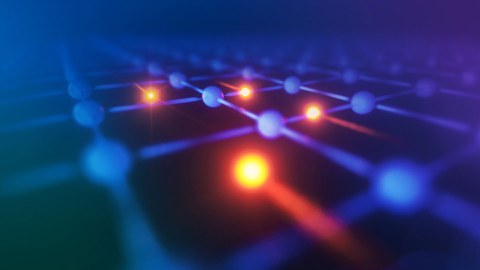Nov 29, 2022
Third funding period for Collaborative Research Center 1143: “Correlated Magnetism: From Frustration to Topology"

Illustration of a novel time-reversal-symmetry breaking state formed by families of four electrons in Ba1-xKxFe2As2.
The Dresden-based Collaborative Research Center 1143 - "Correlated Magnetism: From Frustration to Topology" has been successfully conducting fundamental research in solid state physics for almost eight years. During this time, many groundbreaking contributions in the cutting-edge research field have been made here, which have established Dresden as a top location for topological solid state physics. As the German Research Foundation confirmed today, the CRC will receive a third funding period starting next year. Spokesperson Prof. Matthias Vojta is anything but frustrated by this decision and is looking forward to the scientific "harvest" of the next four years.
At the beginning of every innovation is fundamental research, which involves the discovery and understanding of natural phenomena and principles. Based on these findings, new applications, advanced technologies, materials or artificial intelligence can subsequently be created. Topological solid-state physics is still a comparatively young field of fundamental research and is therefore still full of surprises and unexpected discoveries. On the one hand, it is about discovering phenomena - such as magnetism or superconductivity - that form the basis of modern technologies, and on the other hand, it is about recognizing fundamental principles - such as phase transitions or elementary excitations - according to which the world around us is organized. Topology represents a recent and important extension of these organizational principles.
Since 2015, the Collaborative Research Center 1143 "Correlated Magnetism: From Frustration to Topology" has been dedicated to a large class of magnets in which competing, i.e. frustrated, interactions prevent the formation of conventional magnetic order. Instead, they lead to a variety of alternative and non-trivial phenomena that are often topological in nature. The goal of the CRC is to identify, fabricate, and understand materials in which such phenomena can be observed.
In 21 subprojects in the fields of experimental physics, theoretical physics and inorganic chemistry with a total of more than 130 scientists, numerous groundbreaking contributions to this cutting-edge field of research have been made at the CRC 1143 in recent years, which have established Dresden as a top location for topological solid-state physics and from which numerous new collaborations between Dresden research groups and institutions have grown.
CRC spokesperson Matthias Vojta, Professor of Theoretical Solid State Physics at TU Dresden and also spokesperson of the Cluster of Excellence ct.qmat is extremely pleased with the German Research Foundation’s decision: "The extremely positive reviewer vote is an enormous recognition for our successful work over the past eight years; furthermore, also for the fact that our CRC very coherently and uniquely in Germany shapes and advances the research landscape of quantum magnetism on an international scale. There is still a field full of surprises and unexpected discoveries ahead of us. One of the fascinating and approaching goals is the realization of a non-Abelian quantum spin liquid. Their excitations have the property of not only acquiring a phase factor when spatially swapped, such as fermions, but of changing their entire nature. Such particles are the basis for new applications in quantum¬ information technology. In this sense, fundamental research and functionality in the field of magnetism were and are closely related. Our CRC aims to continue this tradition, and so in the third funding period we will continue to do exciting fundamental research, we will open up new subfields, we will use the infrastructure and expertise built up in the CRC to 'harvest', and we will set the course for the next CRC in physics."
Media inquiries:
Prof. Matthias Vojta
Spokesperson CRC 1143
Tel. +49 351 463-34135
Email:
